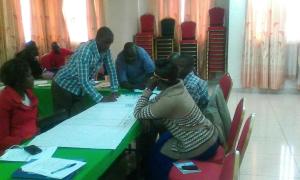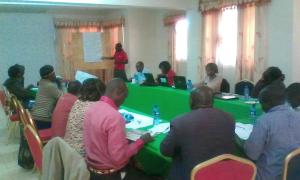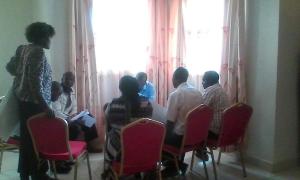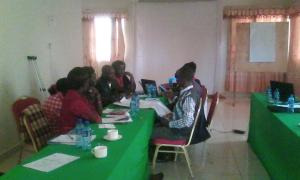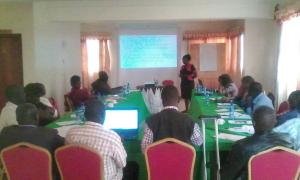Sustained Advocacy Campaigns for Food Security: Strengthening Structures & Strategies of Non-State Actors in West Pokot - Foundation Office Kenya
Workshop
Details
From 6th to 8th April 2016, the Konrad Adenauer Foundation Kenya in partnership with the ASAL Stakeholders Forum (ASF) West Pokot Chapter, organized a capacity building and sensitization training on the topic of food security.
This seminar aimed at strengthening structures and strategies of Non-State Actors for sustained advocacy campaigns and was held at Skynest Hotel in Kitale Town. A significant number of representatives of the relevant CSO, including the National Drought Management Authority (NDMA) West Pokot office, took part in the event.
The workshop was a follow-up activity based on gaps that were identified in the initial training on lobbying and advocacy that was facilitated by the KAS from 27th to 29th October 2015. One of the main challenges, that the former training sought to address, was the fact that since the formation of the ASF West Pokot Chapter – a group of Non State Actors working to promote food security and manage drought emergencies – this new structure still has been facing unique institutional and structural challenges: As a result, the work of the ASF West Pokot Chapter is threatened in its effectiveness in terms of putting into practice the strategies for holding to account government institutions as well as creating awareness on the arrays of challenges which the people of West Pokot are facing with regards to food security. Therefore, the two-day-lasting workshop was to harness the capacities of the ASF committee members with respect to their mandate, which is critical in enhancing the ASF forum’s advocacy and lobbying abilities particularly in promoting the right for the people of the County to be food secured.
A brief background on the role and responsibilities of ASF West Pokot Chapter was shared and presentations were given on possible policies and strategies that can best ensure integration of members within the platform, thereby addressing an essential aspect in achieving the common goal of increased food security and mitigation of any future major drought emergencies. Furthermore, key operational strategies like the need for a framework of engagement and terms of reference for members were also discussed with a consensus from participants to develop a common working document (including an approach to increase membership base) for review. In addition, all participants were taken through identifying elements that distinguish problems based on their individual experiences and their own organizational work-plan. This was done in group works. The outcome of this exercise helped to define the most formidable structures for implementing and coordinating interventions. Actionable information to be shared across the County was discussed in depth with a draft work plan being developed. Moreover, the facilitators pointed out the benefits resulting from developing policy briefs, position papers as well as engagement in community conversations and interactive radio series as fundamental element in informing about budgetary allocation and stirring up public participation in the local political process. The workshop participants also reflected on the role of Community based Disasters Risk Reduction (DDR) plans. Conclusively, they factored these respective thoughts into their work plan on issues they would want to advocate, thereby strengthening their advocacy campaign plan.
A brief history of the ASAL Stakeholder Forum (ASF)
Kenya consists of 47 Counties, of whom 23 are so called Arid and Semi-Arid Lands (ASAL) Counties. West Pokot County is one of them. The Kenyan Government in 2012 developed the ASAL policy session paper no. 08 which subsequently created the ASAL Stakeholders’ Forum (ASF) as part of the ASAL transformation structures and therefore putting in place a national policy on sustainable development. The ASF has a national coordinating office with currently six active semi-autonomous Chapters – including West Pokot County. The roles of the County ASFs are namely to: network and coordinate amongst stakeholders and other development actors aiming to ensure the improved quality of ASAL development policy and practice; to advocate for the interests of ASAL communities to National and County government, media, investors and other development partners.




